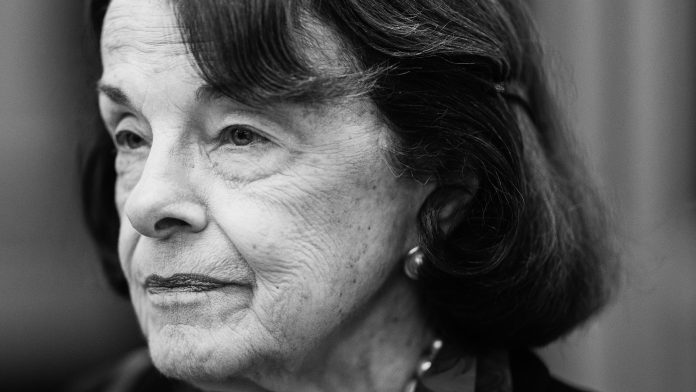Senator Dianne Feinstein, who died last night at 90, braved one of the most remarkable political expeditions in American history—and also one of the grimmer spectacles at the end of her life and career.
Is it too soon to point this out? Yes, perhaps. With the official notice of her death today, Feinstein received her just and proper tributes, hitting all the key markers: How Di-Fi, as she is known in Washington shorthand, had stepped in as mayor of San Francisco after her predecessor was assassinated in 1978. How she was a fervent proponent of gun safety, the longest-serving woman in the Senate, and the chamber’s oldest member. How, as chair of the Senate Intelligence Committee, she presided over the preparation of an incriminating report describing the CIA’s torture of suspected terrorists in secret prisons around the world. How she was a trailblazer, stateswoman, powerhouse, force, grande dame, etc. Give her her due. She deserves it.
But Congress can be a tough and ghoulish place, with its zero-sum math and unforgiving partisanship. Over her last year, Feinstein’s declining health became a bleak sideshow—her absences and hospitalizations, shingles, encephalitis, and bad falls; the lawsuits over her late husband’s estate and the cost of her medical bills and long-term care.
Feinstein’s insistence on remaining in the Senate—and the uncertainty of her schedule—complicated life for Democrats, making it harder for them to hold votes, set strategy, and confirm judges. Her colleagues and White House officials whispered their frustration. And she became the latest exemplar of a basic, egalitarian principle in lawmaking: Even the most legendary figures ultimately amount to a vote. Often your most important job is simply to be available, show up, be counted.
[Franklin Foer: Dianne Feinstein and the cult of indispensability]
When that is in doubt, patience can wear fast. Questions about “fitness” arise. Such is the price of continued residency in the senior center of the Capitol. Feinstein resisted quitting for years, and only grudgingly said she wouldn’t seek reelection in 2024, leaving the race to succeed her in a kind of morbid suspension.
Politics, of course, runs on its own schedules and follows its own rules. A few weeks ago, I asked Adam Schiff, one of the California House Democrats running to succeed Feinstein in the Senate, whether she should step down. In other words, was she fit to serve? Again, maybe this was harsh, but it had become a standard question around Washington and California, and perfectly germane, given the tight split in the Senate. “It’s her decision to make,” Schiff said, a classic duck, but also practical. “I would be very concerned,” he continued, “that the Republicans would not fill her seat on the Judiciary Committee, and that would be the end of Joe Biden’s judicial appointments.” (Politico reported today that Republican Whip John Thune, of South Dakota, said he expects that his party will not resist efforts to fill committee seats left vacant by Feinstein’s death.)
Schiff added that he had continued to have a productive working relationship with Feinstein’s office, despite her health struggles. He was a proponent of business as usual, for as long it lasted, and Feinstein was still there. The pageant continued, the government heading for another shutdown, House Republicans tripping toward an impeachment and over themselves.
In the hours after Feinstein’s death was announced, Washington took a brief and deferential pause. Statements and obituaries were dispatched, most prepared in advance. Then it was on to the next. Who would California Governor Gavin Newsom pick to serve out Feinstein’s term? How would that affect the race to succeed her next year? Who would replace Feinstein on the Judiciary Committee, and when would they be seated?
[Ronald Brownstein: Who will replace Dianne Feinstein?]
The hushed questions about how long the nonagenarian senator could hang on finally had their resolution. Far too many people in power resist the option of a restful denouement. The stakes can be high, even harrowing, for the country. These sagas can be distressing to follow, but there’s no shortage of dark fascination. Stick around too long, and you risk losing control of the finale. It can happen to the best, and at the end of the most extraordinary careers.

















